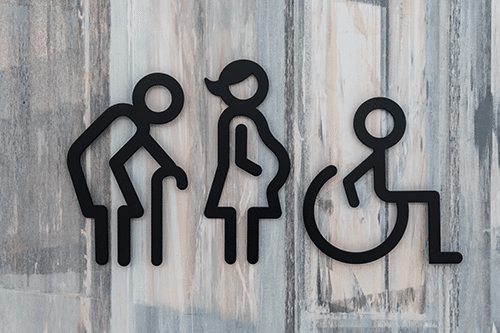If your manager treats you differently than your co-workers, it could be a sign of Discrimination in the Workplace. Workplace discrimination may be at play if you start to see patterns in how your manager treats you and how they treat their co-workers, and those patterns show that you are frequently treated poorly for reasons that don’t make sense. If your job is subpar and does not break any laws, your manager is nonetheless within their rights to take disciplinary action against you. On the other hand, you should be concerned that your manager may be discriminating against you if the bad treatment is happening for no obvious reason.
When discrimination happens in the workplace, it can make you feel helpless and trigger a range of emotions that can be challenging to deal with. A list of five types of workplace discrimination is provided below.
Also read:

1. Sexual Orientation
LGBTQ+ workplace discrimination, is a form of sexual orientation discrimination. It is illegal for businesses to treat their employees differently based on their sexual orientation. This includes being straight, gay, bisexual, or lesbian. Furthermore, it is illegal to treat someone differently just because another person thinks they are a particular sexual orientation. This is referred to as perceptual bias. Assume, for the sake of argument, that you identified as straight but were denied employment at a women-only gym on the grounds that you would be perceived as lesbian and so cause discomfort to the members. This would be discrimination based on sexual orientation in this case.
Sexual Orientation Discrimination Resources:
- Do I Need an Oregon Gender Discrimination Attorney?
- What can I do about LGBTQ discrimination in the workplace?
2. Disability Discrimination
Employers should be making reasonable adjustments to help disabled employees and job applicants because there are a lot of people with disabilities looking for work. Assistance with application forms and access to training opportunities are two examples. It’s critical to acknowledge that you have the same rights as other employees if you have a disability. It is prohibited by Oregon statutes for employers to discriminate based on age.
As an example, Discrimination in the Workplace based on a person’s mental health condition might be considered a disability. It may not always be illegal for an employer to consider a person’s disability when making a decision. You should see an Oregon Discrimination Lawyer for guidance on what to do if you feel you have been the victim of disability discrimination because the law is complicated, and every case is different.
Disability Discrimination Resource:
3. Country of Origin
Discrimination based on a person’s national origin is another form of job discrimination. It is said that a person’s “connection to a country or nation through birth” is their national origin. As an example, let’s say you’re an American citizen by birth but your parents are from Jamaica. Your national origins are Jamaican, even if your nationality in this case would be American. Discrimination based on a person’s language features, such as their accent, can take many forms, including but not limited to ethnic slurs and harassment in the workplace. Getting legal counsel regarding discrimination based on national origin can give you comfort and support, no matter what circumstances you’re in.
Racial Discrimination Resource:
4. Age Discrimination
Age discrimination, also called ageism, is an important form of workplace bias to watch out for. Discrimination based on age occurs when a person is treated unfairly or negatively because of their age. Both federal law and Oregon law forbid age discrimination. If an employer treats an employee unfairly or discriminatorily based on their age and fires them as a result, they may be held accountable for age discrimination. The employer would have to give an adequate rationale for why their actions were not discriminatory if you could demonstrate and prove that their actions were based on your age. If you think you’ve been a victim of age discrimination, it’s best to consult an Oregon Discrimination Lawyer.
Age Discrimination Resources:
5. Pregnancy Discrimination
Regardless of one’s occupation, many people’s lifelong goal is to start a family. Still, worries about becoming pregnant and experiencing pregnancy discrimination are additional factors that can derail plans to start a family, alongside other professional concerns. Any kind of bias against a pregnant woman, her delivery, or her health during pregnancy is illegal under the Pregnancy Discrimination Act, 1978. Furthermore, it should be mentioned that every employee is entitled to maternity leave. One possible recourse in the event of pregnant discrimination on the job is to file a discrimination lawsuit with the help of an Oregon Discrimination Lawyer.
Pregnancy Discrimination Resource:
How hard is it to prove employment discrimination when it happens?
Establishing discrimination in the workplace is not always an easy feat. The reason behind this is that discrimination is not always easy to spot. Circumstantial evidence is more commonly utilized to prove discrimination. As an alternative way of putting it, a jury can conclude from the facts presented that a particular employment action was driven by discriminatory intent. Thankfully, experienced Oregon Discrimination Lawyers that specialize in workplace discrimination can assist you in gathering strong circumstantial evidence to support your claim against your company.
Do not hesitate to get in touch with us at Meyer Employment Law for a free consultation if you believe that you are the victim of age discrimination at work in Oregon. Our Oregon Discrimination Lawyers will support you through every stage of the process, help you establish a compelling case against your employer, and make sure you get the compensation that you are entitled to.
Discrimination Law
Discrimination law in the workplace includes unequal treatment based on age, national origin, race, gender, sexual orientation, pregnancy, injury, disability, and more.
Read more about Oregon discrimination law.




